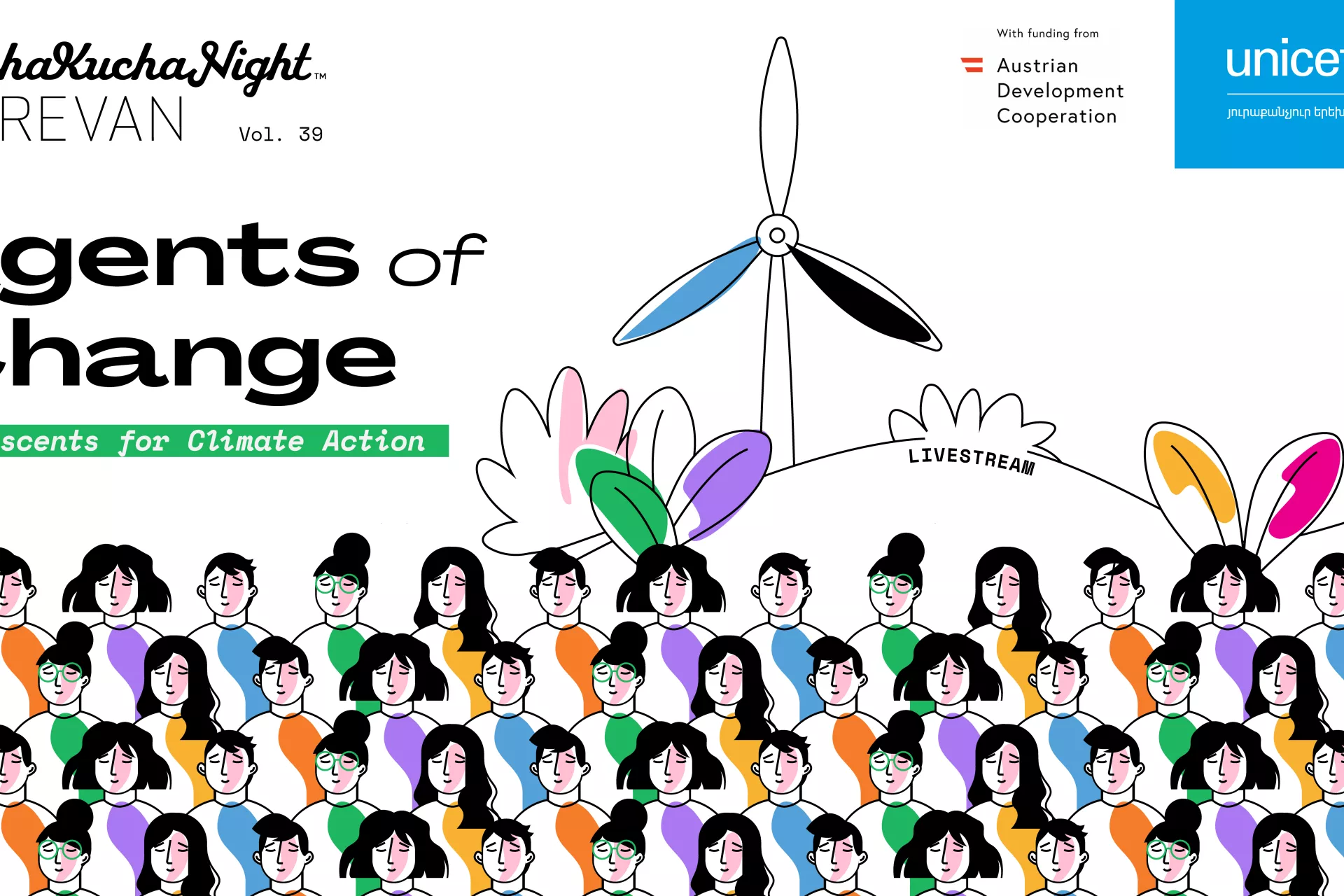Young People in Armenia Advocate for Climate Action with Decision Makers on World Environment Day
Children, decision makers and donors came together in an online PechaKucha event about climate action during the coronavirus pandemic

- Available in:
- Հայերեն
- English
The coronavirus (COVID-19) pandemic has redefined many things, including how children can advocate for their rights in a time when schools are closed and social interactions are minimized. To mark the World Environment Day in Armenia UNICEF Armenia and Austrian Development Cooperation worked together to organize a PechaKucha licensed event and the first of its kind in an online format, entitled “Agents of Change. Adolescents for Climate Action.” The online event brought together 100 participants, including school students and young people from all over the country, environmentalists, decision makers from the Ministries of Environment, Territorial Administration and Infrastructure, as well as Education, Science, Culture, and Sports. Here’s what everyone had to say!

“We are now at the beginning of a big and important effort to engage young people of Armenia and empower them with environmental awareness for a greener and healthier Armenia and a greener and healthier world. What we see this year is a major lesson for all of us. The nature’s tiniest creature - a virus, has stopped the world, stopped the world’s economy. However, we also see that the air has got cleaner and that the nature has got greener. I hope we can learn something from this. Everyone has a role to play in addressing climate change - policy makers, teachers, community members and, of course, adolescents,” said Tanja Radocaj, UNICEF Representative in Armenia.
“Climate change, biodiversity and environment are all very important topics and are high on our agenda. We are happy that this topic is also important for Armenia. Young people are the leaders of the future, and they can have an impact and make a change in their communities by protecting their environment and reducing their carbon footprint,” said Gerhard Schaumberger, Head of Office of Austrian Development Agency.

Lida Minasyan from Gyumri vocational school #4 spoke about the harm inflicted by polyethylene and shared tips on how to make bags that are ecologically friendly. Lida is taking lead and modeling positive behavior as Armenia is getting ready for a total ban of polyethylene bags in January 2022.
David Navasardyan from Little Prince school in Yerevan advocated for food waste management. He presented his research into best practices in this and suggested ways how Armenia could replicate.
Volodya Bazeyan from school #8 in Lanjaghbyur village raised the issue of the kindergarten in his village not being able to operate year-around due to absence of a heating system. Together with his peers, Volodya is trying to find environmentally friendly solutions to fix this issue so that children can continue their early learning.
Lilit Grigoryan from Polytech high school presented her volunteer work at Eco Aghb [eco waste] NGO where, together with other young people, she tries to raise awareness about waste management and promote recycling. There is no planet B, and each and every one of us is responsible for saving our planet,” concluded Lilit.

Participants also heard from Hasmik Barseghyan, environmental management expert, who shed light on the gender side of climate change, talking about how girls and women are affected as a result and what needs to be done to mitigate these risks; as well as from Armine Arshakyan, Principal of school #97 after Grigor Zohrab, who presented how the school’s eco-club was established and works, and from Gagik Sahakyan, Mayor of Spitak, who presented how his community achieved efficiency gains and budget savings from smart use of energy.

“The situation with COVID-19 pandemic today is aggravated by the loss of biodiversity and disruption of habitat, since wildlife is the source of at least 75% of all emerging diseases. We need to stop and understand what impulses the universe is sending to us and redefine our actions,” said Irina Ghaplanyan, Deputy Minister of Environment. “The Government recently submitted an amendment to the Law on Local Self-Governance, which was presented in the first reading in the Parliament yesterday, and which makes it possible for local authorities to request budgetary means for environmental awareness and education. Women’s role is pivotal in pushing forward the ecological agenda both at local, national and global levels.”
“Environmental knowledge has a special emphasis in the general education syllabus and in the competences, currently under development. At the same time, I am convinced that the issues of biodiversity and environmental conservation cannot be addressed through formal education alone. We all have a lot of work ahead of us as individuals and as policy makers,” noted Artur Martirosyan, Deputy Minister of Education, Science, Culture and Sports.
“The Government has quite a few ambitious projects in all the different areas presented today, such as energy efficiency programs in Spitak, Vayk, as well as subvention programs in more than 10 communities in cooperation with UNDP. We have two photovoltaic community stations currently being developed and three more in the row with USAID support. We also have large-scale wastewater management projects in rural communities. All these issues are not easy to solve, but remain high in our agenda,” said Vache Terteryan, Deputy Minister of Territorial Administration and Infrastructure.
Mr Terteryan also proposed to soon organize a virtual event for adolescents where line-ministries can present environmentally friendly state programs that are implemented to raise awareness and hear feedback from young people.
Watch the discussion.




